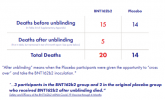Rory
Closed Account
A conspiracy theorist friend forwarded me a 'report' apparently put together by some doctors, scientists and health care practitioners who make up a group called the Canadian Covid Care Aliiance:
https://www.canadiancovidcareallian...tions-More-Harm-Than-Good-REV-Dec-16-2021.pdf
He claims that:
According to the CCCA paper:
The original Pfizer report is here:
https://www.nejm.org/doi/pdf/10.1056/NEJMoa2110345
Lots of other claims in the CCCA paper too (it's 51 pages long).
I will look into it when I get a chance.
https://www.canadiancovidcareallian...tions-More-Harm-Than-Good-REV-Dec-16-2021.pdf
He claims that:
"According to the Pfizer reports that they reported themselves the vaccine does more harm than good."
According to the CCCA paper:
PFIZER’S 6 MONTH REPORT showed:
- an Efficacy of 91.3%. (Which means a reduction in positive cases compared to placebo group)
- compared to the placebo group, an increase in illness and death:
- There is no benefit to a reduction in cases if it comes at the cost of increased sickness and death
The original Pfizer report is here:
https://www.nejm.org/doi/pdf/10.1056/NEJMoa2110345
Lots of other claims in the CCCA paper too (it's 51 pages long).
I will look into it when I get a chance.

